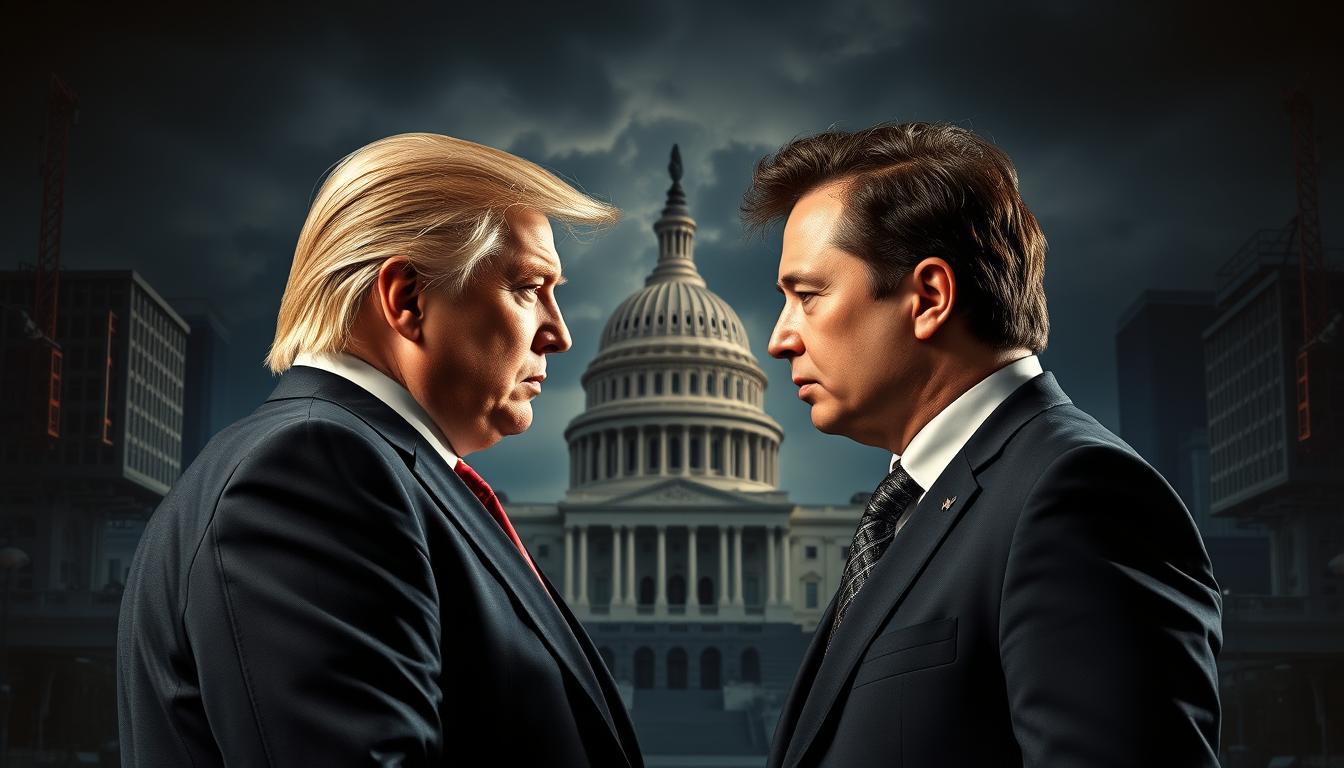The ongoing conflict between Donald Trump and Elon Musk has taken a new turn as the focus shifts to the federal contracts awarded to Musk’s innovative venture, xAI. This clash not only highlights the complexities of political and business relationships in the tech industry but also raises significant questions regarding the implications of federal deals. As Trump expresses his discontent over these contracts, the stakes grow higher for both individuals and their respective enterprises. The outcome of this escalating drama could redefine the landscape of federal partnerships with tech firms, making it essential to pay attention to the details of this unfolding situation.
Key Takeaways
- The conflict centers around federal contracts awarded to Musk’s xAI.
- Trump’s opposition raises questions about government spending and innovation.
- The clash could have significant implications for Musk’s reputation and business practices.
- Political dynamics between Trump and Musk impact the tech industry.
- This dispute highlights the role of federal deals in shaping business relationships.
The Background of the Trump-Musk Conflict
The rivalry between Donald Trump and Elon Musk has unfolded in the context of their unique positions within both the business and political realms. This clash highlights the *Trump political landscape*, characterized by its volatility and contentious nature. Observations of Trump’s previous actions and comments reveal a figure deeply entrenched in political feuds, often exhibiting a combative approach toward adversaries.
Understanding Trump’s Political Landscape
Trump’s political journey has been marked by a series of bold statements and disruptive actions. His tenure as President saw him navigating a complex web of alliances and rivalries, reflecting a style that fosters intense loyalty while inviting considerable opposition. As he prepares for potential electoral confrontations, an examination of his rhetoric reveals a leader determined to shape the narrative, aligning his brand with the sentiments of a dedicated base concerned about technological advancements and their implications.
The Rise of Musk and xAI
On the other side, Elon Musk has emerged as a significant player within the tech industry. His latest endeavor, Musk xAI, aims to push the boundaries of technological advancement with cutting-edge artificial intelligence. The mission of xAI underscores Musk’s intent to innovate while also raising ethical questions about the implications of rapid technological growth. This juxtaposition of Musk’s aspirations and Trump’s political maneuvering sets the stage for an intriguing political feud, as both figureheads seek to assert their influence in overlapping arenas of technology and governance.
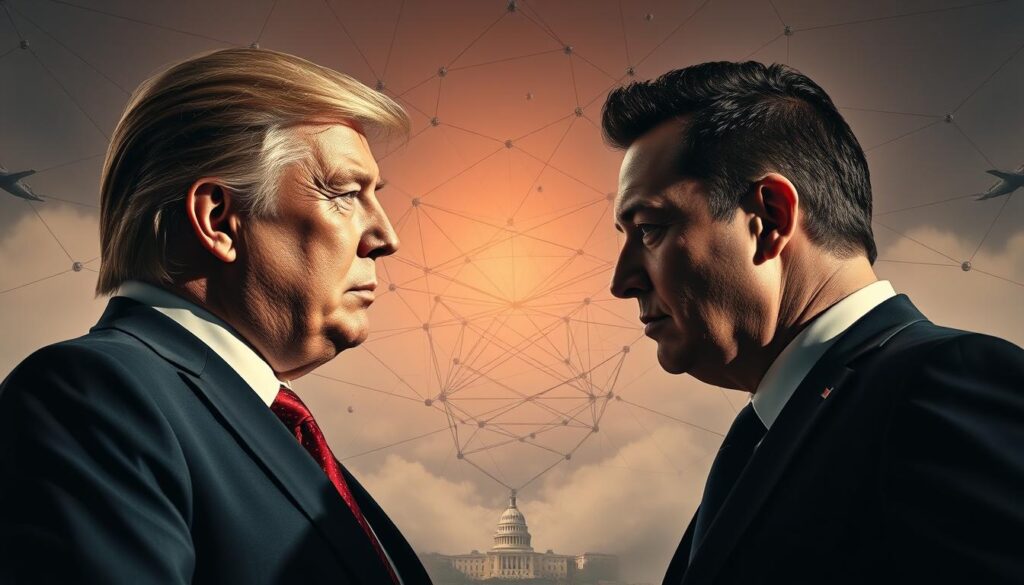
Top picks for "trump clash musk"
Open Amazon search results for this keyword.
As an affiliate, we earn on qualifying purchases.
The Federal Deal: xAI’s Recent Contract Win
The landscape of federal contracts continues to evolve, with xAI making significant headway after securing a substantial contract with the Pentagon. This contract, valued at $200 million, represents a notable achievement for the company and its founder, Elon Musk. As the technology firm steps into the realm of defense, the implications extend beyond mere financial gain.
The Pentagon’s $200 Million Contract
The recent xAI contract with the Pentagon is a landmark development in military technology advancements. This $200 million deal signals a growing trust in xAI’s capabilities to deliver innovative solutions that could assist in national security efforts. The decision by the Pentagon to partner with a tech company led by Musk highlights a shift towards leveraging cutting-edge technology in defense strategies, further validating the role of artificial intelligence in contemporary military operations.
Implications for xAI and Musk’s Reputation
Winning the Pentagon contract enhances Musk’s standing within the tech community, showcasing his ability to navigate complex federal contracts. This win serves as a testament to his vision for xAI and its potential impact on national defense. Yet, certain reputation implications arise from this association. While many will celebrate this achievement, others, including prominent figures like Donald Trump, express concerns over the ethical dimensions and potential backlash that could accompany federal contracts awarded to private companies. This evolving narrative places Musk’s reputation at a crossroads, balancing success in business against the scrutiny tied to his partnerships with government entities.
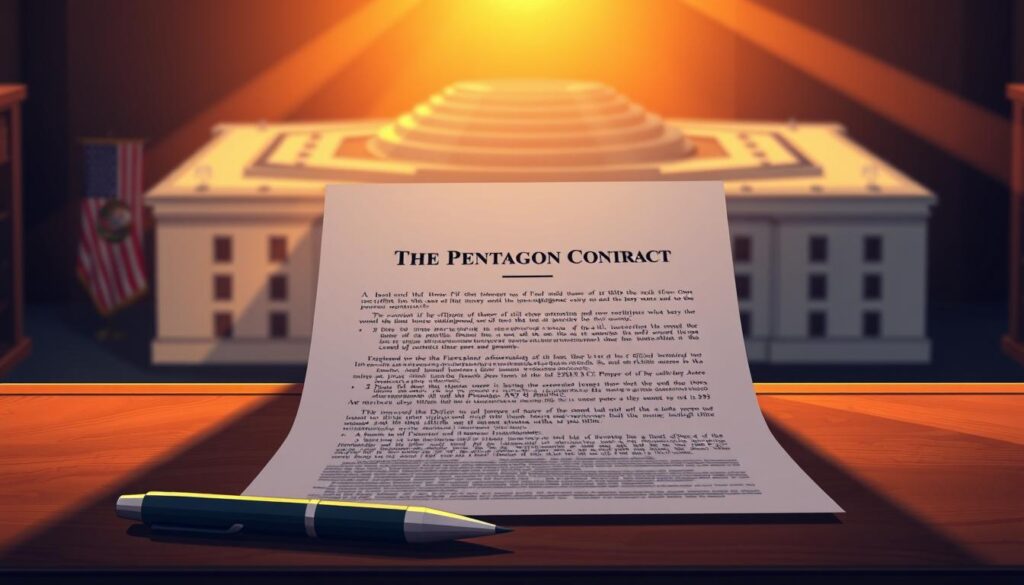
Trump Opposes Federal Agencies Contracting with Musk’s xAI
Recent statements from Donald Trump reveal his staunch opposition to federal agencies awarding contracts to Musk’s xAI. He argues that the multitude of federal contracts granted to Musk’s ventures raises ethical questions regarding government funding and private interests. In his public declarations, Trump has emphasized a desire to withdraw substantial subsidies that benefit Musk’s enterprises, framing these actions as essential for protecting American jobs and interests.
Trump’s Public Statements and Concerns
Trump’s comments express a profound concern over the direct impact of federal contracts on national interests. He claims that the financial support provided through Musk xAI subsidies undermines local businesses. In his view, awarding contracts to a company closely tied to Musk could lead to favoritism and a lack of accountability. Trump has been vocal about this perspective in various speeches and public forums, positioning himself as a defender of American values against perceived corporate overreach.
How This Affects Government Subsidies
The implications of Trump’s opposition could extend beyond Musk’s xAI, potentially reshaping the federal subsidy landscape. If federal contracts face increased scrutiny, innovation in the tech sector may suffer. Trump’s narrative suggests a shift in public policy that evaluates the balance between fostering industry growth and ensuring that taxpayer dollars support responsible, accountable business practices.
| Aspect | Trump’s Position | Musk’s Perspective |
|---|---|---|
| Federal Contracts | Claims favoritism and ethical concerns | Advocates for innovation and progress |
| Musk xAI Subsidies | Calls for withdrawal to protect American interests | Argues that subsidies are crucial for advancement |
| Impact on Industry | Believes it produces unfair competition | Claims it’s essential for technology development |
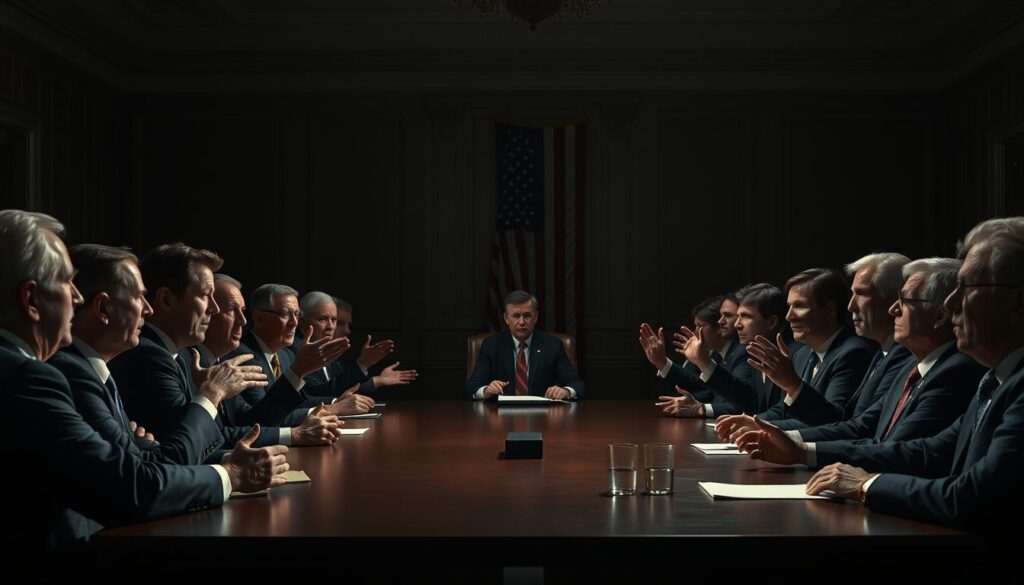
The Broader Debate on Government Subsidies
The discussion surrounding government subsidies is complex and multi-faceted. These financial aids aim to support businesses and help them thrive in competitive environments. Prominent figures in the tech industry, such as Elon Musk, often benefit from federal spending aimed at fostering innovation. However, voices like Donald Trump caution that such subsidization might hinder long-term competitiveness, fueling the ongoing innovation vs complacency debate.
Understanding Federal Spending and Contracts
Federal spending plays a pivotal role in shaping industries. Government subsidies direct funds towards specific sectors, influencing the trajectory of innovation. This spending can enable startups and established companies alike to expand their operations, improve research and development efforts, and launch groundbreaking technologies. Yet, concerns persist about how effectively these funds are utilized and whether they serve as a catalyst for growth or a cushion for laziness.
Do Subsidies Foster Innovation or Complacency?
The tension between supporting innovation and potentially breeding complacency is a central theme in current economic discussions. Proponents argue that government subsidies create opportunities that would otherwise be unattainable, allowing companies to invest in innovative projects. Critics contend these subsidies may create a safety net, leading firms to rely on government support rather than striving for self-sufficiency. This dynamic raises significant questions about the long-term implications of federal spending on business motivation and progress.

Musk’s Response to Trump’s Accusations
Elon Musk has actively engaged in a public relations effort to counter the accusations leveled by Donald Trump. His Musk response emphasizes the credibility of xAI and the strategic merits of winning government contracts. In the face of criticism regarding federal support for his companies, Musk seeks to frame these contracts as vital for innovation and growth rather than relying solely on subsidies.
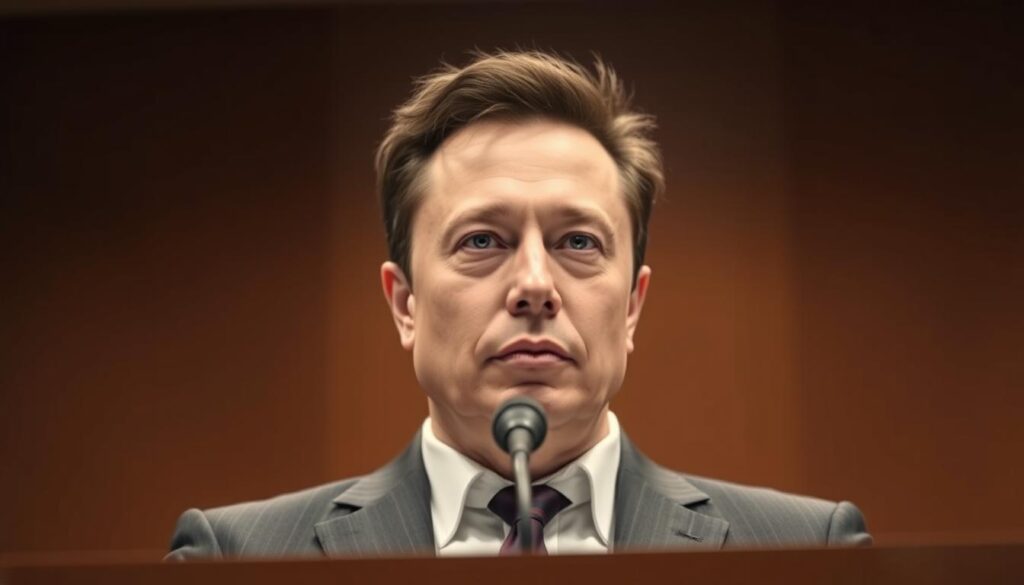
Defending xAI and His Business Practices
In defending xAI, Musk has highlighted the firm’s commitment to excellence and innovation in technology. He articulates that the federal contracts won by xAI are not just a matter of favoritism but are awarded based on merit and capability. This perspective aims to showcase xAI’s valuable contributions to national security and technological advancement. Musk reinforces that his approach aligns with fostering long-term benefits rather than focusing on immediate financial gains from governmental support.
The Stakes for Tesla Amidst the Controversy
The current controversy poses significant Tesla stakes as the company faces fierce competition in the electric vehicle market. Musk acknowledges the pressure on Tesla to maintain investor confidence during challenging economic quarters. He speaks to Tesla’s position as a leader in the EV sector, despite external challenges such as declining profits and a rapidly changing marketplace. By addressing these concerns head-on, Musk strives to reassure stakeholders that the company’s innovation-driven strategy remains steadfast against the backdrop of political tensions.
Political Implications of the Clash
The recent confrontation between Donald Trump and Elon Musk unveils significant political implications as the Trump 2024 campaign gears up. This clash not only illustrates the friction between a former president and a leading tech mogul but also raises questions about their respective influences on the political landscape. Understanding how these developments shape voter perceptions becomes crucial, especially given Musk’s influence in political circles.
How This Affects Trump’s 2024 Campaign
Trump’s positioning against Musk’s xAI highlights a wider narrative within his campaign strategy. As he critiques this tech venture, he addresses concerns over government contracts and the power of private companies. Such tactics may resonate with his base, which often views tech giants as adversaries. The upcoming elections will likely depend on how effectively he utilizes these sentiments to rally support against perceived establishment influences.
Musk’s Influence in Political Circles
Musk’s standing as a pivotal figure in technology and innovation provides him with a unique foothold in politics. His decisions and public reactions can sway public opinion, potentially impacting the Trump 2024 campaign landscape. Observing this dynamic sheds light on the broader role technology leaders play in shaping political discourse, making it essential to consider how Musk’s influence might align or clash with Trump’s objectives.

The Media’s Role in the Trump-Musk Dispute
The media plays a critical role in shaping the narrative around the Trump Musk dispute. Various outlets cover the confrontation, highlighting different angles that influence public perception. By analyzing coverage, it becomes evident how biases and perspectives modify the discourse and impact opinions about both figures involved.
Coverage Analysis: Bias and Perspectives
Media coverage of the Trump Musk dispute can vary dramatically, with some outlets portraying Trump as a protector of economic interests while others paint Musk as a visionary challenging the status quo. This range of perspectives influences how the audience interprets the events surrounding the conflict. Factors contributing to this difference may include editorial slants, audience demographics, and the underlying political climate. The portrayal of Musk’s federal contracts and Trump’s opposition influences public perception significantly.
Public Perception and Media Narratives
Media narratives surrounding the Trump Musk dispute not only impact immediate reactions but also shape long-term public perception. For instance, amplifying Trump’s criticisms and framing them within broader issues of government subsidies can lead citizens to develop more favorable or unfavorable views of both Musk and Trump’s intentions. As narratives evolve, they can either reinforce or challenge existing biases, further complicating the relationship between the public and these influential figures in technology and politics.
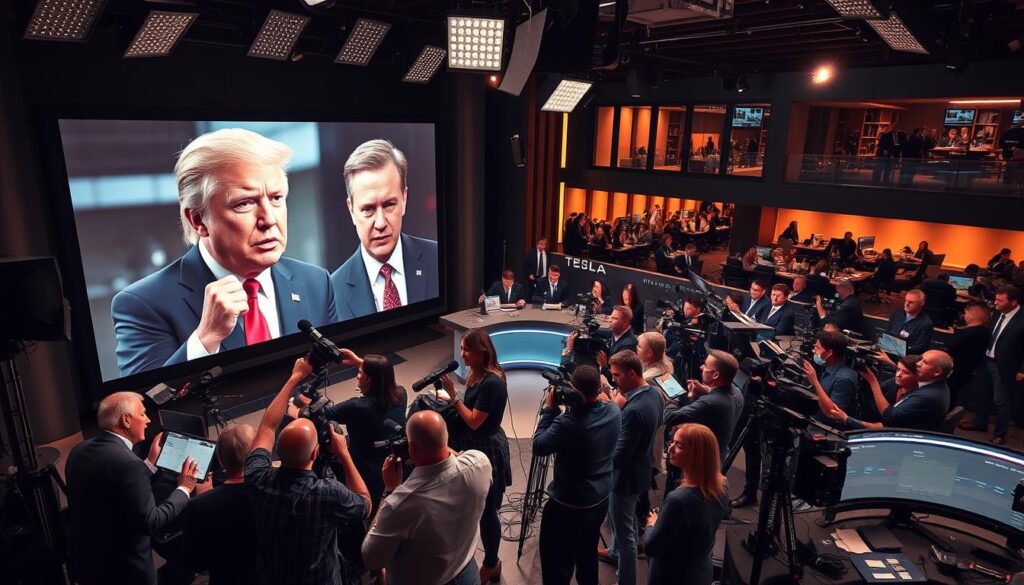
Potential Outcomes of the Conflict
The ongoing clash between Trump and Musk over federal contracts with tech companies raises significant questions about the future of xAI and its ability to operate within a complex political landscape. Various factors come into play as industry dynamics shift rapidly, leading to potential outcomes that could affect both parties involved.
What This Means for xAI’s Future
The future of xAI stands at a crossroads, shaped by emerging federal policies and the ongoing discourse surrounding technological innovation. As xAI seeks to establish its foothold in defense and governmental sectors, public perception and political support will play a crucial role. If collaboration between tech innovators and government agencies can be maintained, xAI may navigate these turbulent waters effectively, further solidifying its relevance in federal arenas.
Future of Federal Contracts with Tech Companies
The mounting tensions could reshape the landscape for federal contracts with tech companies. Increased scrutiny on partnerships may lead to more stringent regulations aimed at balancing accountability with innovation. The implications of these changes could foster a more competitive environment, enabling startups and established companies to vie for lucrative federal contracts. Understanding this evolving terrain remains vital for stakeholders invested in the tech industry’s future.

Conclusion
As we navigate the intricacies of the Trump-Musk conflict, it becomes clear that this rivalry is more than just a clash between two powerful figures. The implications stretch far beyond personal grievances, impacting the broader tech policy debate surrounding government contracts and subsidies. With xAI’s significant contract under scrutiny, we see how Trump’s opposition may not only affect Musk’s standing but also set the stage for future implications in federal contracting norms.
The ongoing tensions illustrate the delicate balance needed between supportive government roles and the competitive nature of the private sector. As we consider potential paths for resolution, it’s essential to reflect on how these developments may shape policy discussions moving forward. Ultimately, this conflict serves as a poignant reminder of the challenges and responsibilities facing both government and innovators in fostering an environment conducive to American innovation.
In summary, the Trump Musk conflict summary highlights a pivotal moment in tech history, challenging stakeholders to rethink their strategies. As we look ahead, understanding these dynamics will be crucial in shaping the landscape of tech policies and the relationship between government and the industries that drive progress.
